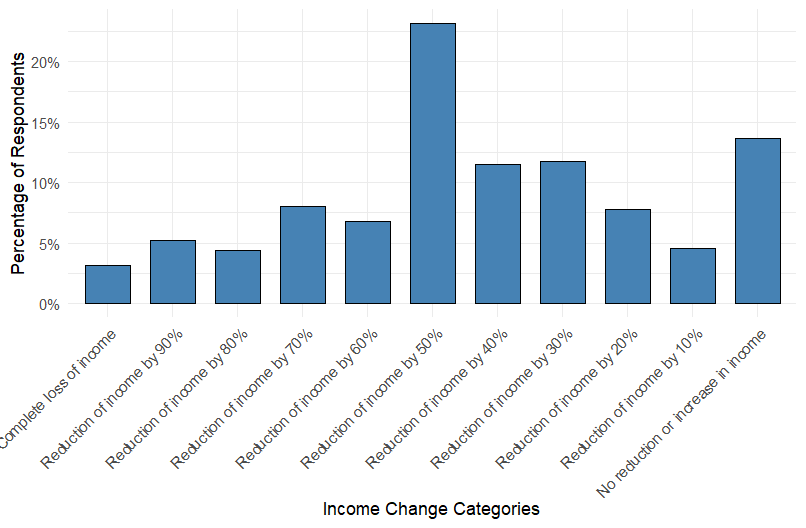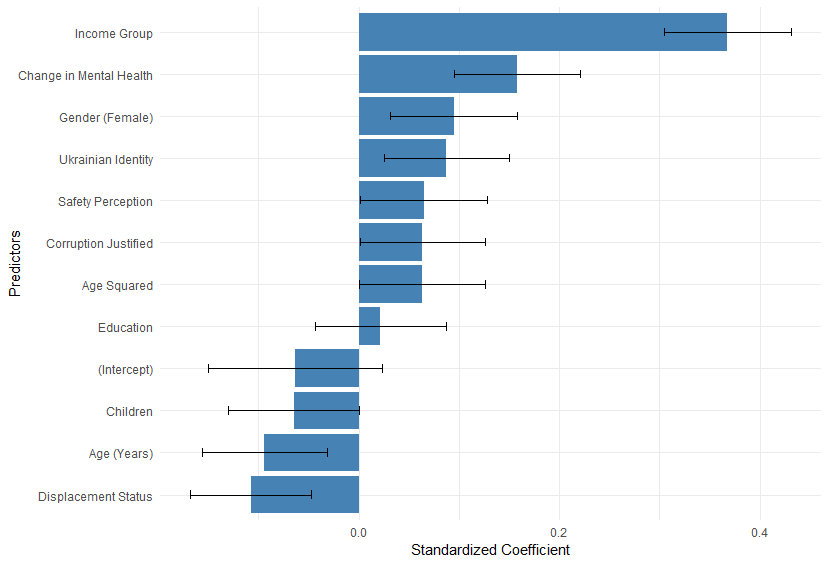This study examines the impact of the ongoing war on household income. Based on a survey of 850 individuals, the analysis reveals that displacement, deterioration of mental health, and safety concerns significantly correlate with income reduction among respondents. Individuals from lower-income groups, older workers, and households with children are at risk of experiencing greater income loss during the war.
Wars cause significant economic and labor market disruptions, leading to considerable income losses. Among war-induced sources of income changes for households, previous studies typically emphasize the adverse impact of displacement, mental health deterioration, and security issues. In particular, forced migration due to conflict disrupts individuals’ economic stability by displacing workers from their jobs, businesses, and agricultural lands. Displaced individuals often face limited access to employment opportunities, resulting in significant income loss. Furthermore, the destruction of property and community networks often makes it difficult for displaced populations to rebuild their economic prosperity.
Mental health changes are another negative factor: Witnessing war typically causes trauma, depression, and anxiety that can impair individuals’ ability to work or engage in economic activities. Studies have shown that war-related mental health issues, such as post-traumatic stress disorder, can reduce labor productivity, diminish social capital, and restrict recovery efforts in post-conflict settings. This is particularly significant in conflict zones where healthcare resources are limited and psychological support is scarce.
Finally, perceived insecurity may also play an important role in income reduction during war. Сonstant threats of violence discourage investments, limiting employment opportunities in the affected areas. The uncertainty caused by an ongoing war leads to diminished income-generating opportunities, making it challenging for individuals to preserve steady sources of income.
Ukraine has been no exception to these trends. As shown in Figure 1, Ukrainians reported a substantial decline in income since the outbreak of the full-scale war in 2022. Nearly 23% of respondents said that their household income had decreased by around 50%, while about a third reported income reduction exceeding 50% or a complete loss of income. Only 13% of respondents stated that their household income had remained unchanged or even increased since the Russian full-scale invasion of Ukraine.
Figure 1: Distribution of respondents across income change categories (percentages)

Note: Data comes from a survey conducted in November 2024 (see the following link for a survey description). We asked respondents to self-estimate the change in their household income since February 2022. The response scale included the list of choices displayed in Figure 1, ranging from 1 “Complete loss of income” to 11 “No reduction or increase in income.”
This study aims to analyze whether war repercussions discussed above are associated with household income change in Ukraine. The investigation is based on applying an OLS regression to data from a unique survey designed by the author and conducted by Research.ua LLC in November 2024. The sample includes 850 respondents aged 16 to 55, representing the primary working-age population. A detailed description of the survey can be found here.
The dependent variable is the change of income, measured by asking individuals to report perceived alterations in their household income since February 2022, using a response scale presented in Figure 1. The self-assessed income changes are modeled through the Mincer equation, which views earnings as a function of schooling, labor market experience and socio-demographic characteristics. Since the survey does not include a direct measure of work experience, age is used as a proxy. Additionally, households’ wealth group is accounted for by asking respondents to choose their monthly household income group ranging from 1 “less than 5,000 hryvnias” to 5 “more than 50,000 hryvnias.”
Table 1 summarizes the estimates of the Mincer equation. Wealth group and age appear to be the most important predictors of income change (see Model 1). Individuals with higher income levels are more likely to maintain their economic well-being and mitigate income reduction during the conflict. At the same time, preserving income becomes more challenging for older or, by extension, more experienced respondents. However, the negative impact of age on income retention diminishes as age increases, suggesting a nonlinear relationship between the two variables.
The impact of the two above factors remains strong and statistically significant even after including the conventional socio-demographic characteristics available in the survey (see Model 2). Additionally, the controls reveal that females are more likely than males to retain their income during the war, while having at least one child is negatively associated with income maintenance. One possible explanation for this finding is that women may be more resilient in times of crisis due to factors such as employment in less volatile sectors (e.g., education, healthcare, and social services) and greater adaptability in informal or remote work opportunities. By contrast, having at least one child can limit labor market participation and increase financial strain during crises, including conflicts.
Table 1: Regression Coefficients for the Mincer Model of Income Change
| Dependent variable: | |||
| Income change in percentages | |||
| (1) | (2) | (3) | |
| Education | 0.053 | 0.030 | 0.037 |
| (0.059) | (0.059) | (0.057) | |
| Age | -0.230*** | -0.186*** | -0.163** |
| (0.067) | (0.070) | (0.068) | |
| Age2 | 0.003*** | 0.002** | 0.002** |
| (0.001) | (0.001) | (0.001) | |
| Wealth group (1 = Less than 5,000 hryvnias per month, 5 = More than 50,000 hryvnias per month) | 0.974*** | 0.995*** | 0.999*** |
| (0.090) | (0.091) | (0.088) | |
| Female (Male = Ref. category) | 0.371** | 0.512*** | |
| (0.177) | (0.174) | ||
| Children (No children = Ref. category) | -0.416** | -0.351* | |
| (0.186) | (0.181) | ||
| Belong to the Ukrainian nation
(1 = Entirely disagree, 7 = Entirely agree) |
0.190*** | 0.158*** | |
| (0.058) | (0.057) | ||
| Corruption can be justified (1 = Entirely agree, 7 = Entirely disagree) | 0.055 | 0.076** | |
| (0.039) | (0.038) | ||
| Displacement status (Not displaced = Ref. category) | -0.695*** | ||
| (0.199) | |||
| Safety perception (1 = Feel entirely unsafe, 7 = Feel entirely safe). | 0.104** | ||
| (0.052) | |||
| Change in mental health due to the War
(1 = Deteriorated a lot, 6 = Did not change at all) |
0.353*** | ||
| (0.072) | |||
| Constant | 7.879*** | 5.846*** | 4.224*** |
| (1.197) | (1.270) | (1.280) | |
| Observations | 850 | 850 | 850 |
| R2 | 0.149 | 0.172 | 0.220 |
| Adjusted R2 | 0.145 | 0.164 | 0.210 |
| Note: The dependent variable is self-estimated income changes since February 2022 as presented in Figure 1. *** p<0.01, ** p<0.05, * p<0.10. | |||
A strong sense of Ukrainian national identity is positively associated with income preservation during the war. A strong sense of national identity can positively influence income during conflicts by fostering social cohesions, psychological resilience, and a sense of responsibility to contribute to the collective effort. Individuals with strong national affiliation may also be more likely to engage in behaviors that support their income maintenance, such as continuing work or accessing state support programs designed to aid citizens during crises. However, this positive relationship may also reflect reverse causality, suggesting that individuals whose income did not decrease significantly during the war are more likely to have a stronger affiliation with their nation. Numerous studies have documented this positive impact of income on national identity.
Finally, moral values, such as intolerance toward corruption, initially do not show a significant association with income changes (see Model 2). When the war-related predictors are included in the model, however, this variable becomes statistically significant (see Model 3).This is likely due to omitted variable bias arising from a correlation between the corruption justification variable and war-related predictors. One possible explanation for this relationship is that intolerance toward corruption encourages people to avoid exploitative practices or engage in formal economic systems. Hence, adherence to ethical standards could help individuals secure stable income sources and reduce the risks of financial exploitation in times of crisis.
Most importantly, the results suggest that individuals who are displaced, either internally or externally, experience a negative change in their income. Specifically, income reduction is by 0.70 points larger (p<0.01) for those displaced internally or externally if compared to non-displaced individuals. As previous evidence suggests, this may happen due to disrupted access to employment, markets, and social networks.
Additionally, ensuring a sense of safety for individuals may help contribute to the preservation of their income. A one-point increase in safety (on a 7-point scale) is associated with a 0.1-point improvement in income maintenance (p<0.05). This finding corresponds to previous research suggesting that a sense of safety during conflict can encourage economic activity, which contributes to the preservation of income. Secure environments enable individuals to remain productive or access support, all of which may protect their economic prosperity.
Finally, the results indicate that mental health can also channel the impact of war on income in conflict zones. A one-point improvement in mental health (on a 6-point scale) is associated with a 0.35-point improvement in income change (retention) measure. This finding is consistent with existing studies suggesting that preserving mental health can help maintain income stability in times of crisis. Conversely, those affected psychologically by war experience income loss, as worsened mental health negatively influences decision-making, productivity, and the ability to seek out resources or support.
Overall, mental health is one of the strongest positive predictors of income stability (see Figure 2) while displacement emerges as the strongest negative correlate. This suggests that the war has introduced additional challenges to the economic stability of Ukrainian households.
Figure 2. Standardized Coefficients from the OLS Regression Analysis

Several conclusions can be drawn from this analysis. First, the ongoing conflict reduces income, which may stem not only from the immediate repercussions of war, such as destruction and increased military spending, but also from the populations’ deteriorating mental health, security concerns, and displacement. In the post-war period, it will be necessary to implement a broader set of policies involving, for instance, improving mental health support and ensuring that Ukrainians feel secure in their place of living.
Second, the war is likely to have more severe consequences for certain population subgroups, which may further aggravate poverty and income inequality within society. Vulnerable groups may include low-income individuals, older members of the workforce, and households with children. Targeted policies addressing the specific needs of these groups will be essential to ensure that post-war reconstruction in Ukraine allows all segments of the population to benefit equally.
Third, odd as it may sound, income reconstruction policies should overlap with institutional reforms and identity-strengthening measures. Implementing a zero-tolerance policy toward corruption would help increase households’ official incomes by discouraging illegal financial practices and promoting economic transparency. Similarly, strong national identity can play a crucial role in fostering economic recovery, as it may enhance income levels through the promotion of social cohesion, trust, and collective action. Ideally, the concept of equitable individual prosperity should be integrated into the Ukrainian national identity, as the nation’s well-being is inherently linked to the well-being of all its members.
Photo: depositphotos.com/ua
Attention
The author doesn`t work for, consult to, own shares in or receive funding from any company or organization that would benefit from this article, and have no relevant affiliations



